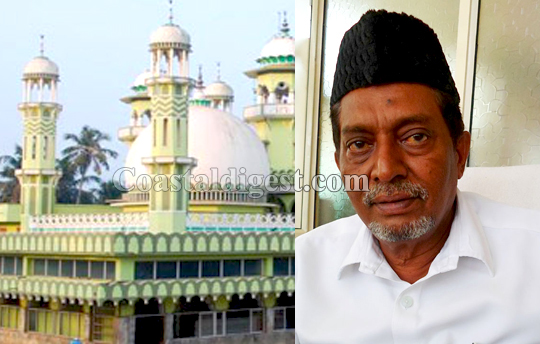Mangaluru, May 24: Nearly a month after he was chosen as the president of the management committee of the Ullal Juma Masjid and Sayyid Madani Dargah, Abdul Rasheed Haji Ullal has once again proved his majority.

A peace meeting was held at Thakwa Masjid in the city between the members belonging to two groups of Dargah committee on Monday morning under the leadership of AP Aboobakar Ustad, the general secretary of All India Sunni Jam-Iyyathul Ulema.
The meeting was the result of a dialogue between leaders of both groups initiated by UT Khader, the health and family welfare minister, who is also the local MLA
In the meeting Rasheed Haji Ullal claimed that he had clear majority as 26 of the 49 members in the committee supported him. UT Khader, AP Ustad, DK Wakf advisory committee president SM Rashid Haji, Hyder Parthipady, Kanachur Monu, Shafi Saadi, Yenepoya Abdulla Kunhi among others were present in the meeting.
AP Ustad asked the president to prove his majority on the same day. Accordingly, a meeting was held in the evening at Ullal Dargah, where Rasheed Haji Ullal proved his majority.
However, AP Ustad said that the election of the new president would be formally announced by Sayyid Koorath Thangal, the Khazi of Ullal, who will return from Umrah pilgrimage on May 26.
In fact, Rasheed Haji Ullal was elected president of the committee on April 26 in a formal meeting, which was boycotted by a few members backed by Ullal Khazi. On the same day, Ullal Khazi had organised a separate meeting and declared his favourite candidate Bukhari as the new president. This had resulted in a clash between followers of two groups.
Also Read : Ullal Dargah: Now, no miracles; only clashes!






Comments
The business center......... which suck blood of poor people ..In the name of fake karaaamaath.... All Malamath....
Same like the alive god mens in Hindus we have them dead...
Ullal Darga is a money making factory. And the shirk is the main product. Every one will face tough time in Aakhirath who involved in this
Business. Please keep yourself away so that you may be spared from the harsh punishments of Allah Subuhaanahu Wa Tahaala
Its clear that good leaders never support Shirk.
The criminal leaders only will support the shirk.
All the leaders in the shirk committee are only criminals.
All problem was created by AP fraction under the support of Ullal Kazi Khoora Thangal.
Khoora Thangal failed to act fairly even knowing who has majority instead he appointed Bukhari who is involved in many criminal activity as President of darga.
Now Khoora Thangal have no right to continue as Khazi he should resign immediately and ask forgiveness from Allah
What a shame, None of them are scared about akhira all they want is paisa paisa.
Add new comment